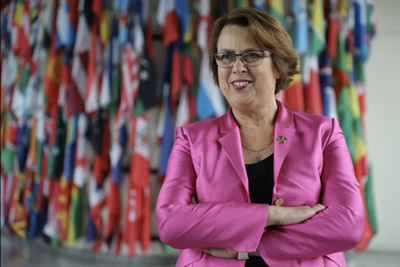Written bySimonetta Di Pippo, Head of United Nations Office for Outer Space Affairs (UNOOSA)
Science, technology and innovation (STI) have historically had a significant impact on the society and today, more than ever, we much better contemplate the benefits of space exploration and use.
Satellites contribute to around 40 percent of SDG targets, are indispensable for gathering data on majority of Essential Climate Variables and are critical for managing the full disaster cycle. Space assets also contribute considerably to global GDP.
Today’s rapid growth of the space industry is thus a positive development for the world. Innovation and ingenuity are constantly deriving new down-stream applications and services for a wide range of sectors and democratization of space is enabling access to space-based data, applications and services to an increasing share of the world’s population.
However, billions of people still lack access to even the most basic benefits. The Office for Outer Space Affairs (UNOOSA) works to bridge this space divide to prevent space becoming yet another field contributing to growing inequalities. As the UN’s gateway to space, UNOOSA is uniquely positioned to enhance the use of space science, technology and applications for sustainable development in all UN Member States.
Our capacity-building work covers the entire spectrum of space science and technology and has enjoyed great success. However, the requirements for 21st century capacity-building have evolved together with the developments in the space sector. To comply with novel needs, we have innovated our approach.
Under Access to Space for All initiative launched in 2018, UNOOSA has consolidated several existing workstreams and developed new partnerships with a range of space stakeholders to make space-based benefits more accessible to communities around the world.
Through the initiative, we offer the full range of access to space from gravity experiments, through satellite development, launch and deployment, to access to orbit, the International Space Station (ISS) and China Space Station for educational and research purposes.
In May 2018, Kenya deployed its first satellite under our joint project with the Japan Aerospace Exploration Agency – KiboCUBE. The 1KUNS-PF CubeSat was also the first satellite launched under the UN auspices. Moreover, this year we will witness the deployment of the first Guatemalan satellite.
Expanding opportunities for accessing space is very important but must be carried out in a responsible manner. UNOOSA supported the establishment of Kenya’s national space agency to ensure country’s compliance with international space law. To assist all UN Member States in adopting appropriate policies and national legislations, we recently launched the Space law for new space actors project. Such targeted capacity-building is an integral component in the effort of promoting rational and liable conduct on part of both emerging and established space actors.
Rapid advancement of science and technology in space offers exciting opportunities but carries along also notable changes and challenges. Our dependence on space is growing, and so are the risks of losing these benefits. Global communication, logistics and transportation, time tracking, and financial services – all are reliant on satellites. Bridging the space divide is critical for improving the well-being around the world, however, maintaining space safe, secure and sustainable is the pre-condition for success.

